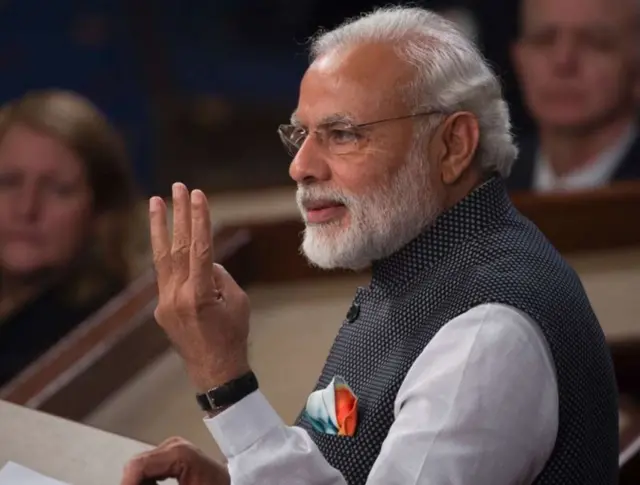Indian Prime Minister Narendra Modi addressed a joint session of Congress on Wednesday, emphasising the importance of a continued relationship between the world’s oldest democracy and its largest.
But this visit to the United States, Modi’s fourth since he became prime minister two years ago, was undertaken with a unique purpose: to sow the seeds of a resolute alliance that will last beyond President Barack Obama’s term.
“Our nations may have been shaped by differing histories, cultures and faiths. Yet our belief in democracy for our nations and liberty for our countrymen is common,” Modi said in his congressional address. “The embrace of our partnership extends to the entirety of human endeavour — from the depths of the oceans to the vastness of the space.”
Unlike in past trips to the United States, Modi wasn’t greeted by throngs of tens of thousands at venues as large as Madison Square Garden. Instead, he got right down to business.
In meeting with Obama on Tuesday and both houses of Congress 24 hours later, Modi was on a mission to emphasise his country’s close relationship with the United States and cement ties with its biggest trading partner before Obama leaves office next January.
During a joint meeting Tuesday, Obama and Modi announced that India would work closely with the United States to join the Paris Agreement on climate change.
The United States and India are the second and third largest greenhouse gas emitters in the world, respectively.
“Both Obama and Modi think that they have very strong moral obligations for the future to do something about the problem,” said Andrew Light, distinguished senior fellow at the World Resource Institute’s Climate Programme.
But while the prime minister’s speech to Congress was largely filled with praise for America’s long-standing relationship with India, when he did mention climate change, the Republican side of the House chamber fell noticeably quiet.
Modi is likely to find more bipartisan support in the area of nuclear and defence trading.
The United States lifted its three-decade-long ban on the sale of nuclear materials to India in 2005, forming one of the largest civil nuclear trading partnerships in the world. Obama also has voiced his support for India’s acceptance into the Nuclear Suppliers Group, a coalition of 48 nuclear-supplying nations that advocates non-proliferation by controlling nuclear exports.
India is the globe’s second-largest buyer of American-made weapons.
According to Sadanand Dhume, a resident fellow at the American Enterprise Institute, a centre-right research centre, American lawmakers and policy experts see India’s growing strength as a way to curb a potential Chinese hegemony in that part of the world.
“Many people in US foreign policy circles see India as a potentially stabilising force in Asia,” Dhume said.
Modi acknowledged in his address that his nation’s push toward modernisation greatly depends on support from the United States, calling his ally an “indispensable partner” in that effort.
With the results of this year’s US presidential election uncertain, however, the prime minister has just months before he could be dealing with President Donald Trump or Hillary Clinton.
But irrespective of the presidential race and regardless of its result, Dhume said Modi wanted to consolidate the gains he’d made with Obama and build on them with whoever may come to occupy the White House next year.
Furthermore, according to Light, Obama has his legacy to account for, and acting to curb climate change is a massive part of that.
Modi ended his 45-minute speech by saying, “The constraints of the past are behind us, and foundations of the future are firmly in place.”
(AP)
 简体中文
简体中文

